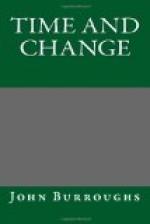In the afternoon we availed ourselves of the five or six miles of narrow-gauge railway, the only one on the island, to go from Paia to Wailuku, where we were met by another automobile, which hurried us to Lahaina, where we were to meet the steamer that was to convey us to Hilo, on Hawaii. I say “hurried,” but before the journey of twenty-odd miles was half over, we realized the truth of the old adage, “The more haste, the less speed.” The automobile began to sulk and finally could be persuaded to go only on the low gear, and to rattle along at about the speed of a man with a horse and buggy. We reached Lahaina just as the boat was entering the harbor.
The next morning we found ourselves steaming along past the high, verdant shores of Hawaii. For fifty miles or more the land presented one unbroken expanse of sugar-cane, suggesting fields of some gigantic yellow-green grass. At Hilo the sun was shining between brief showers, and the air was warm and muggy. It is said to rain there every day in the year, and the lush vegetation made the statement seem credible. Judge Andrews met us at the steamer, and took us to his home for rest and dinner, and was extremely kind to us.
In the mid-afternoon we took the train for Glenwood, thirty miles on our way to the volcano of Kilauea. A large part of the way the road leads through sugar plantations, newly carved out of the koa and tree-fern wilderness that originally covered the volcanic soil. Clusters of the little houses of the Japanese laborers, perched high above the ground on slender posts, were passed here and there. Everywhere we saw wooden aqueducts, or flumes, winding around the contours of the hills and across the little valleys, often on high trestle-work, and partly filled with clear, swift-running water, in which the sugar-cane was transported to the mills.
At Glenwood stages meet the tourists and convey them over a fairly good road that winds through the tree-fern forests to the Volcano House, ten miles away. The beauty of that fern-lined forest, the long, stately plumes of the gigantic ferns meeting the eye everywhere, I shall not soon forget. I saw what appeared to be a large, showy red raspberry growing by the roadside, but I did not find it at all tempting to the taste.
It was dark when we reached the Volcano House, and we saw off to the left a red glow upon the fog-clouds, like the reflected light from a burning barn or house in the country, and inferred at once that it came from the volcano, which it did. From my window that night, as I lay in bed, I could see this same angry glow upon the clouds. The smell of sulphur was in the air about the hotel, and very hot steam was issuing from cracks in the rocks. A party of tourists on horseback, in the spirit of true American hurry, visited the volcano that night, but we chose to wait until the morrow.




